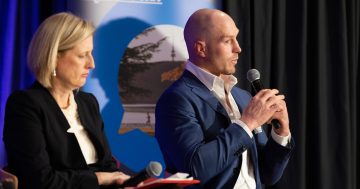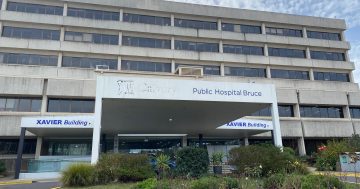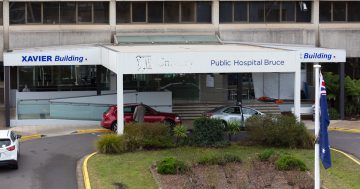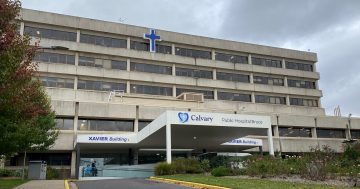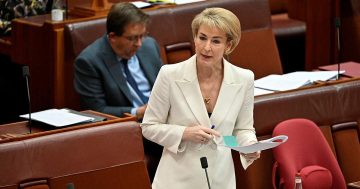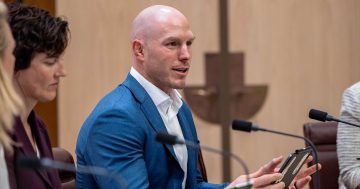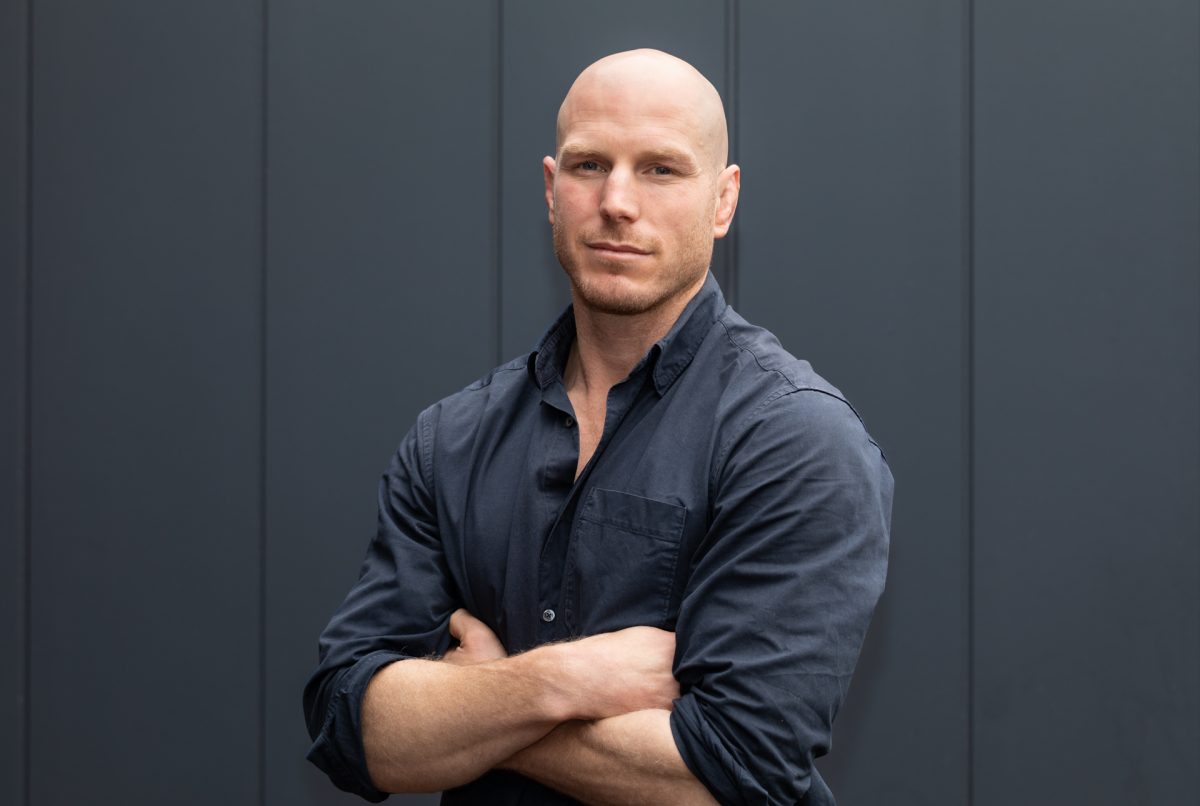
ACT Independent Senator David Pocock opposed Canavan’s amendment to the self-government law, but supported public hearings in the ‘interest of transparency’. Photo: Michelle Kroll.
Don’t pass the Self-Government Amendment Bill – that’s the recommendation from a Federal Senate committee inquiring into Senator Matt Canavan’s attempt to change the law that determines the Territory’s rights.
But not every committee member was happy with the decision, with the Opposition Senators who took part in the inquiry reaching the opposite conclusion.
The Australian Capital Territory (Self-Government) Amendment Bill 2023 would have required the ACT Government to conduct an inquiry into the Health Infrastructure Enabling Act 2023 that allowed for the compulsory acquisition of Calvary Public Hospital Bruce (now North Canberra Hospital) earlier this year.
The Senate inquiry report found it wasn’t for the committee to determine whether the Territory government had “sufficiently scrutinised” the legislation, other than to note scrutiny had taken place in accordance with the government’s own “legislative procedures and oversight mechanisms”.
“Whether those procedures and mechanisms are adequate is ultimately a matter for the electors of the ACT to judge,” their report stated.
“Amending the Australian Capital Territory (Self Government) Act 1988 to require the Government of the Australian Capital Territory to conduct an inquiry would undermine the independence of that legislature.”
It determined that passing the bill would constitute an “unwelcome interference” by the Commonwealth Parliament on the “proper functioning” of the Assembly, which would contradict the principles of the original act and the Restoring Territory Rights Act 2022.
Such concerns had been raised throughout the inquiry’s public hearings on Monday (4 September), with the ACT Solicitor-General Peter Garrisson arguing Canavan’s bill sought to “interfere in the routine performance” of Territory functions, which he felt was not consistent with the principles of “representative and responsible government”.
“I think it would be unprecedented for one legislature to seek to direct the executive of another government to undertake an executive action,” he told the inquiry.
“It would mean – subject, of course, to the Commonwealth’s constitutional power – that it could do the same thing in relation to a state government.
“That is effectively: ‘We don’t like what you’ve done. We’re going to pass an act and tell you to look at it again,’ which really flies in the face of basic principles of our system of government.”
Not everyone agreed.
A dissenting report was issued by Opposition Senators, who stated they felt the compulsory acquisition of the North Canberra Hospital had unfolded in “deeply concerning circumstances”.
“It has been marked by an unfortunate absence of consultation, a contrived sense of urgency, a blatant dismissal of significant health system risks, and a concerning indifference to employee rights,” they wrote.
“The evidence provided to this Committee demonstrates the clear need for an inquiry into the ACT Government’s unprecedented use of its compulsory acquisition powers.”
It described the ACT Government’s decision as “hasty” and said the public wasn’t given a proper chance to have their say on the move, arguing the consultation which had taken place in regards to a new hospital on Canberra’s northside did not mention compulsorily acquiring assets to do so.
“Given that the ACT Government must have been preparing detailed legislation to acquire Calvary’s assets at this time, this evidences that the ACT Government for some time had a predetermined view with respect to the action it was proposing to take,” the Opposition Senators wrote.
“Given the failure of the consultation process to canvass compulsory acquisition and the timing of introduction of the Health Infrastructure Bill, in the view of Opposition Senators, the ACT Government’s claims that it conducted consultation are disingenuous.”
This view was backed by some submissions, including from the Archdiocese of Canberra and Goulburn and the Australian Catholic Bishops’ Conference.
ACT Independent Senator David Pocock was also part of the committee and provided additional comments at the end of the report.
He noted he did not support the bill or the establishment of the inquiry but supported the public hearing in the “interest of transparency”.
“Legislation committees which consider bills are controlled by the government, and on principle I do not support the government using its numbers on these committees to block public hearings on matters that they do not agree with,” Mr Pocock stated.
He said testimony from the hearings confirmed neither Calvary Health Care nor the Catholic Archdiocese of Canberra and Goulburn had requested the Territory’s acquisition law be referred to relevant Assembly committees for inquiry, and he had written to ACT Chief Minister Andrew Barr and Health Minister Rachel Stephen-Smith asking them to consider an inquiry at Territory-level where members of the public could be heard.
Ms Stephen-Smith confirmed she had passed his request on to the relevant committee chair for consideration, but the committee had decided to continue with private briefings on the matter.
“Ultimately, the decision to hold an inquiry rightfully rests with the ACT Legislative Assembly, as a democratically elected institution and I respect their consideration of my request on behalf of the community members that raised concerns with me,” Mr Pocock said.
“The Senate recently reaffirmed its commitment to the rights of people living in Australia’s territories, being the rights of those people – people in my community that I have great respect for – to democratically elect a legislature and a government to self-govern with the same legislative freedoms as the states.
“Allowing the Commonwealth to interfere again would undermine the very recent conclusion of the 25-year-long campaign to undo the Andrews Bill and put the ACT back onto equal footing with the states.”
The Senate will vote on Canavan’s proposed bill at a later date.












